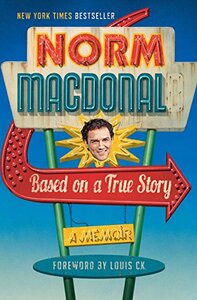You need to sign in or sign up before continuing.
Take a photo of a barcode or cover
Real rating:3.5 stars
It definitely goes in a direction I was not expecting, but I appreciate the unique way the story is told.
It definitely goes in a direction I was not expecting, but I appreciate the unique way the story is told.
adventurous
funny
informative
lighthearted
reflective
slow-paced
adventurous
funny
lighthearted
adventurous
dark
funny
lighthearted
fast-paced
A hilarious descent into madness as alleged comedian Norm Macdonald recounts something resembling his life story to lackey Adam Eget as they travel across America in search of money, heroin, and enlightenment. Meanwhile, Norm's unfortunately named ghostwriter attempts to come to terms with the task he has acquired and his place in the world.
Full of Norm's typically twisted sense of humour,Not A Memoir had me laughing out loud many, many times.
Oh, and it has an extended version of the moth joke in it!
Full of Norm's typically twisted sense of humour,
Oh, and it has an extended version of the moth joke in it!
The only book on my shelf marked as both "Fiction" and "Non-Fiction". If you like Norm, you'll like this.
funny
All I knew about Norm Macdonald before reading this book was his time doing weekend update on SNL, and I thought reading his memoir would be a good way to learn more about him. I sincerely hope this book should actually be labeled fiction, as I would hate to believe even 5% of it was true. There was a lot of talking abut killing oneself, and for me, that is just not something to joke about. There are obviously a lot of people out there who do like this book, but it was not for me, and after reading it, I don't think I will be checking out any of the TV shows or films he appeared in.
Not my thing. A dry comedic fictional version of Norm's life and times. I dig Norm as a comedian but didn't find this funny.
A parody of Fear and Loathing. A spoof of a spoof. No one wrote pure stupidity better than Norm and it’s a shame he didn’t author more books. This book in essence was his epic. Akin to Steve Martin’s The Jerk it is a collection of the whole of his career as a stand-up comedian. Surprisingly, of the stand-up books I’ve read this one was the only one that was actually funny. Hysterically funny.
challenging
funny
lighthearted
reflective
fast-paced
Norm is so self-aware in this book it's an astonishing feat.


